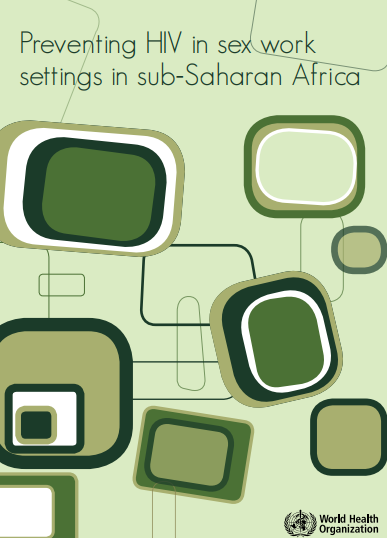
Preventing HIV in sex work settings in sub-Saharan Africa
The main focus of this report is to review the risk factors for and burden of HIV in sex work settings in sub-Saharan Africa, and the interventions that have been successfully implemented in this region. The report presents the key components of a health sector response necessary for accelerating prevention of HIV and other STIs among sex workers and their clients, and provides recommendations for implementing such services.
This report is aimed at country-level HIV programme officers responsible for designing and implementing HIV services. It may also be useful for nongovernmental, community-based or other organizations planning services in sex work settings.
Information is presented in three major sections. Section 1 summarizes the epidemiology of HIV and other STIs among sex workers and their clients. It also includes a description of the key sociodemographic features of sex workers which, at least in part, account for their vulnerability.
Section 2 summarizes evidence on the effectiveness of interventions for reducing the acquisition of HIV in sex workers and their clients, as well as the importance of HIV treatment, prevention and care services for sex workers with HIV. Some of the interventions described in the report are:
- Collection of strategic information on HIV and other STIs among sex workers and their clients
- Formative assessments to determine the needs and vulnerabilities of sex workers
- Involvement of sex workers in the design and delivery of programmes
- Promotion by the health sector of legal and social frameworks that are rights based and consistent with public health and HIV prevention goals
- Promotion of and support for condom use
- Detection and management of STIs
- Provision of behaviour change communication through peer outreach
- Provision of family planning, counselling and contraception
- Enabling people to know their HIV status
- Provision of HIV treatment and care
- Prevention of HIV in infants and young children
- Prevention and treatment of viral hepatitis
- Prevention of HIV transmission through injecting drug use.
The practical steps required for implementing such services are outlined in section 3, which highlights the need to define the role of national-level coordination, outreach through peer sex workers and the importance of involving sex workers in all aspects of HIV programming in sex work settings. The report concludes with an overview of surveillance and research priorities (section 4) and provides recommendations for HIV prevention interventions targeting sex workers and clients in sub-Saharan Africa.



